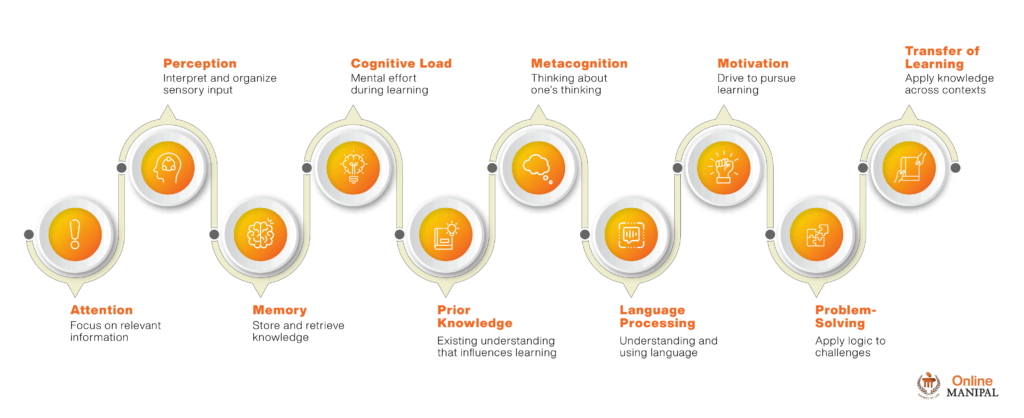Although technology had evolved, we had to wait until COVID-19 to fully grasp online learning. But ever thought about the science behind it? Knowledge has been floating around for a long time, and the ways the human mind has absorbed it have varied.
And then online learning has now taken the forefront of education, creating a wave of revolution, or in simple terms, making the lives of millions easier. When asked about e-learning, students often mention that it’s flexible, provides a remote environment, and saves a lot of money, among other benefits.
But ever thought that’s really why it is successful? Definitely not for the above reasons. It has more to do with the psychology of it. The beauty lies within how the human mind perceives it. And, on a very serious note, this blog discusses the hidden mechanism, i.e., the psychology that fuels its continued success.
An interesting find: Advantages of Online Learning for Working Professionals
Understanding the Psychology of Learning
When we examine the basic psychology of learning, it reveals how individuals perceive and respond to their environment. This runs deep, helping educators understand the various learning strategies by examining their cognitive abilities.

Why Online Learning Works: The Psychology Behind Its Effectiveness
Initially juggling both challenges and opportunities, online learning has now become more adaptable among individuals. There was always a misconception that it was less effective than traditional classes. However, this only remained true because it was the less-traveled road. Eventually, the situation became better, and it turned out that the above cognitive metrics can also be applied to online learning.
But how is that possible? Let’s find out.
Also read: Online learning: Pros and Cons of Online Education
Self-regulation
If you are an online student who can manage your schedule, attend classes, focus on the topics, and stay motivated, then you have cracked the code of self-regulation. It is extremely challenging to accomplish all this without external supervision. This skill acts as an add-on for future job performances and also improves emotional intelligence.
Self-efficacy
As the saying goes, “It starts with you” having a mindset that you will succeed, regardless of the circumstances, is one of the most crucial motivational drive required for online learning. Hence, students with self-efficacy are at the core of overcoming any technical challenges, turning their focus to course modules, which in turn leads to academic success.
Cognitive Load Theory
Did you know that our brain can only take a limited amount of knowledge at a time? This concept is known as the cognitive load theory. As a being in the online learning realm, students will have to do a lot of heavy lifting, such as navigating the LMS, attending classes, processing the course structure, breaking down the syllabus, and consuming it into digestible chunks, among other tasks.
Intrinsic Motivation
Every student should have an internal drive to achieve success. It can be both upsetting and exhausting to take in a lot at once. Unlike an external factor, such as a professor, there will be no direct supervision to monitor the students. Hence, showing up with higher persistence rates and connecting online education with personal goals, among other things, will take online learners a long way.
Give this a try: The Psychology of Motivation
Mindset Theory
Carol Dweck introduced a new theory called mindset theory. This interesting theory explains how different people can think about intelligence. It is broadly divided into two types, namely growth mindset and fixed mindset. The former focuses on people who stress that abilities cannot be changed and are said to be static. Whereas on the other side, the latter is a big thumbs up on the belief that intelligence can shape abilities and it tends to evolve.
Also read: Unlocking Career Growth: The Transformative Power of Online Learning
Learner Autonomy
Every student has a unique learning process. This depends on various factors such as their personal goals, the environment they live in, their level of interest, and so on. Learner autonomy is the process wherein the learner is the sole responsible person and free to take up strategies on how they move forward with their learning journey. Speaking in the context of online learning, this is where students can shine by carefully managing their time, staying motivated, and using their resources mindfully.
How Online Learning Impacts Student Behavior and Outcomes
Every student is unique, and so is their learning journey. Hence, online learning has brought quite some unexpected benefits among students as follows:
Better Self-Discipline and Responsibility
Online learning enables students to manage and go through their schedule in a very disciplined manner. Moreover, this indirectly makes them more self-regulated, which is considered an essential skill needed throughout the enjoyable voyage of online classes.
Students learn to:
- Set goals
- Manage distractions
- Track progress
- Reflect on learning strategies
More Inclusivity for Different Learning Styles
This is no ordinary traditional learning method. Online learning can be way more interesting with the addition of images, statistics, voice notes, and so on, enabling students to absorb content in a way that suits their individual preferences.
Empowerment of Quiet or Anxious Students
Not everyone thrives in a traditional classroom. Online forums allow introverted students to participate at their own pace, expressing their thoughts without the pressure of speaking in front of a group. This creates more equitable participation, ensuring diverse voices are heard.
Development of Metacognitive Skills
Online learners often become more aware of their learning process. This is called metacognition, the ability to think about one’s own thinking.
It helps students:
- Identify what works for them
- Adjust strategies when they struggle
- Become independent, lifelong learners
Conclusion
The secret behind the success of online learning isn’t just access or convenience, it’s psychology. By aligning with how the brain learns best through autonomy, rewards, personalization, and reflection—online education provides students with the tools to thrive.
Of course, it’s not perfect. But when thoughtfully designed and paired with a little self-awareness, online learning can be just as impactful, if not more, than traditional classrooms.
When it comes to Online Manipal, we have a dedicated LMS (Learning Management System) that helps our online learners with an excellent course structure, which enables them to manage their cognitive load effectively. Further, it also supports autonomy and plays a great role in their academic success.
Prepare for your next career milestone with us












